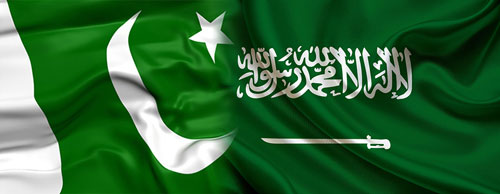Gauhar Zahid Malik
Islamabad
Pakistan’s geo-strategic position makes it significant for regional and trans-regional countries, particularly in the Middle East and Africa, for whom it can serve as the key hub for regional and international economic connectivity.
Arab region spreading from Strait of Hormuz to The Horn of Africa is closely linked with Pakistani not only due to centuries-old ideological links but culture, economic and diplomatic connections also constitute strong bound of liaison between Pakistan and the region.
Pakistan’s relationship with the Gulf region reached a new peak in early 2020 when visiting Saudi Prince Muhammad bin Salman surprised and pleased Pakistanis by saying that “consider me as Pakistan’s Ambassador in Saudi Arabia” and highly successful visit of His Highness Sheikh Mohamed bin Zayed Al Nahyan, Crown Prince of Abu Dhabi and Deputy Supreme Commander of the UAE to Islamabad in early 2020.
However continued tension, diversified commercial interests and race for strategic interests have led the Gulf States and Iran to a confrontation point making it difficult for countries like to maintain a balance. More recently Pakistan had to face some challenges in re-strengthening its historical cordial bilateral relations with certain Arab states due to induction of third parties. Nevertheless Pakistan’s importance as a commercial hub between Central Asia, the Middle East and Africa cannot be undermined as the region continues to look towards Pakistan as the only major Islamic state which could bridge the gap between the Iranian and Saudi camps.
Prime Minister Imran Khan and Chief of Army Staff Gen. Qamar Javed Bajwa did offer their ‘good offices’ to contain rising tensions among Islamic countries during 2018 and 2019 and the two leaders paid several visits to the regional capital to explore the possibility of mediation.
However, some regional leaders were less interested in immediate mediation and wanted the other side to first accept the terms before talks could even begin forcing Pakistan to abandon its efforts. There were also some misconceptions among Arab/Gulf states that Pakistan’s moves to strengthen its strategic links with Turkey and opening trade links with Iran could have an adverse effect on Islamabad’s special relationship with its Gulf partners.
At the same time India which emerged as a new Western ally began asserting its extensive presence in the Gulf and began withdrawing from Iran, most probably to please the United States and Israel. The rising influence of India in rapidly turned geopolitics of the region backed by Indo-US strategic cooperation and Indo-Israel nexus did create some misconceptions about for Pakistan-Arab traditional links and had some hostile impact on Pakistan’s relations with Arab countries.
However, Pakistan’s strong defence and security relationship with the key Gulf States and significant cooperation against terrorist outfits backed by hidden hands continued to play an effective role for longstanding collaboration. One of the finest general of Pakistani armed forces, Gen. ® Raheel Sharif was deputy to head the Saudi led Alliance of Muslim countries against terrorism and solidify unity among Islamic states.
Nevertheless the uncontrolled free-wheeling and often misguided media outlets influenced by floods of fake-news and false propaganda in social media made the situation tense and complicated to revive the relationship.
To overcome the challenges Pakistan and Arab states soon realized the importance of inter-action by youths, students and media personnel (journalists) and increase commercial inter-actions.
In recent months Pakistani and Arab leadership reiterated more than once that both remain strongly committed to the fraternal relationship while Islamabad repeatedly stressed all-out support in defence of Holy land and interests in continued collaboration with all strategic allies.
However, Pakistani political leadership also made it known that the country would not take side any sectarian divide or disputes that does not coincide with the country national interest. PM Imran Khan Government also stressed that it will become no more battleground for sectarian wars and neither will fight wars that are not in its national interest.Another aspect of misapprehension developed due to a false assumption by India and the United States that Pakistan’s collaboration with China on the promotion of CPEC projects would have a negative impact on other regional ports due to the strategic importance of Gwadar deep-sea port.
However, lately, Pakistan has been able to communicate to its Asian-Arab partners that all the regional states and commercial institutions can equally benefit from the CPEC-related projects as Pakistan was ready to serve as regional hub connecting oil and products supplies to and from the world to China and Central Asia’s landlocked countries.
Several Arab states included Oman, Jordan, Kuwait and Iraq have indicated their willingness to explore Pakistan’s offer to serve as a business nucleus while all sides recognized the fact that “common and shared interests” offers a lot of potential and opportunities for injecting a new life to diplomatic, economic and cultural ties.
The rise of Israel in the region following recognition by certain countries also presented a strong challenge to Pakistan’s foreign policy and its historical ties with Islamic states and Israeli factor is likely to play a major role in defining future political and the strategic relationship among regional allies.
However, Pakistan has made it clear that irrespective of increasing outsiders influence in the Arab world, Pakistan shall continue to remain a vital country relevant to every regional equation and would play a decisive role in the promotion of peace and stability.










